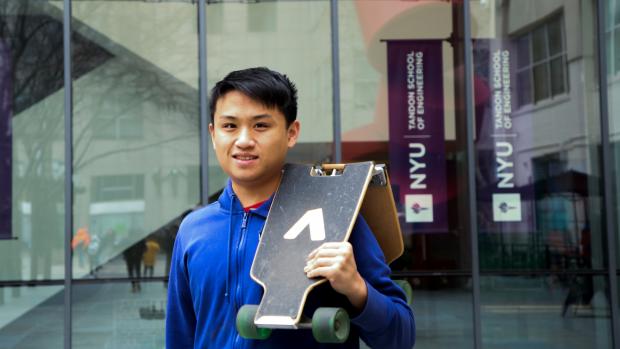Alan Lu’s Excellent Adventure: From Folding Skateboards to Computer Science

NYU Tandon freshman Alan Lu, co-designer of a folding skateboard and co-founder of Board Up.
Students at NYU Tandon are a diverse group, not only in terms of where they are from but where their entrepreneurial passion leads them — from vertical farming to mining regolith on Mars. But first-year student Alan Lu might very well have a “leg up,” so to speak, when it comes to dreaming up something new: the computer science major is the co-designer of a folding skateboard and co-founder of Board Up, the company that manufactures and markets it.
Lu — who was born in the United States, moved to Shanghai while still in kindergarten, then returned to the Silicon Valley area after seventh grade — had always had a fondness for inventing things, but skateboards were far from his mind.
“I ride every day now, but when I was a little kid I was not into skateboards,” he said. Rather, he built a toy cannon in grade school with some PVC pipe, a bicycle pump, and a trigger mechanism of his own design. After escaping this episode without injury or broken windows, Lu developed more sophisticated and serious interests as he grew older — complemented by his education in science and technology and immersion in China’s tech scene.
But then came high school and the inconvenience of getting to and from his friends’ homes; he sought a means of personal mobility more exciting than a bicycle and was inspired by the then-new (and prohibitively pricey) powered skateboards hitting the market. So he did what any intrepid high schooler would do: took matters into his own hands and, with some help from his engineer father, designed and built an electronic skateboard for a fraction of the cost of a ready-to-ride model.
Though the size of the controller — the unit the rider holds like a key fob in one hand — makes it more of a two hander, the board worked.
“The problem was it weighed 30 pounds and was over four feet long! That’s when I started thinking about ways to make a foldable skateboard,” he said. “My father and I discovered that the few models of folding boards out there were either not comfortable enough to ride or simply too inconvenient. We thought we could do better.”
The two developed a unique design configuration that employs robust hinge hardware and a latch/unlatch mechanism connected to a pedal-style lever. After releasing their first model around the time Lu graduated, they focused on a best-of-both-worlds product that improved portability without sacrificing the comfortable, stable ride that comes with a large board surface. “We tested and launched a lot of models … and had to fix as we went along”, said Lu.
The father-son duo kept tinkering with the schematics, incorporating feedback from customers that led to a longboard that snaps shut like a book with just a kick of the chrome lever flush with the board’s tail. The design, which employs a spring-loading mechanism on the board’s underside, also allows a rider to do a one-handed opening move by putting a little “English” on the board when dropping it; the centripetal force creates a large enough angle at the hinge to allow it to spring right back to its open position when the board meets the turf.
The latest version is available on Amazon and BoardUp’s website, and the company plans both a smaller version and one featuring motorized wheels and even Bluetooth speakers. So far, Board Up has sold more than 2,000 of the boards, although Lu admits not all of them for a profit. “I’m selling boards to friends and friends of friends to spread the word,” he explains. Yet, without a lot of marketing muscle, endorsements have rolled in from more than 50 social media mavens, with some pop star credibility: singer Shawn Mendes rides the skateboard in a video with YouTube star Casey Neistat (who has over 10 million subscribers), and reviewed one.
Meanwhile, with a computer science degree in his sights, Lu has slightly less time to devote to the enterprise, though he still keeps a foot in, and on the business — since he rides his Boardup every day, making him the ultimate brand ambassador.




